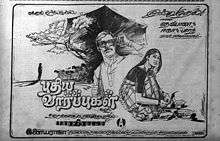Puthiya Vaarpugal
Puthiya Vaarpugal (lit. 'New Mouldings') is a 1979 Tamil language film, directed by P. Bharathiraja. K. Bhagyaraj and Rati Agnihotri played the lead roles in this film along with Goundamani and G. Srinivasan. The music was composed by Ilaiyaraaja.[1]
| Puthiya Vaarpugal | |
|---|---|
 Poster | |
| Directed by | P. Bharathiraja |
| Produced by | P. Bharathiraja |
| Screenplay by | K. Bhagyaraj P. Bharathiraja |
| Story by | R. Selvaraj |
| Starring | K. Bhagyaraj Rati Agnihotri Goundamani |
| Music by | Ilaiyaraaja |
| Cinematography | P. S. Nivas |
| Edited by | R. Bhaskaran |
Production company | Manoj Creations |
| Distributed by | Manoj Creations |
Release date | 14 April 1979 |
| Country | India |
| Language | Tamil |
The film marked the debut of Bhagyaraj as a lead actor. The film was remade in Telugu as Kotha Jeevithalu.[2] The movie was shot in picturesque locations in the Theni area of Tamil Nadu.
Bhagyaraj is the dialogue writer and hero of this movie. Bhagyaraj used this fact in his own Dhavani Kanavugal movie where he cast his mentor P Bharathiraja in a cameo role (movie director) as himself who decides to cast an extra(Bhagyaraj) as hero and dialogue writer of his movie after accidentally discovering his skills. [3] [4] This movie remains CULT status and one of the finest works of BharathiRaja
Plot
Shanmugamani(K. Bhagyaraj) arrives in the village of Thaayamangalam as the new school teacher and soon falls in love with a local damsel Jothi (Rati Agnihotri). The village head called as "Periyavar" (played by G. Srinivasan) is a lecherous and sinister man who has a lustful eye on Jothi. Amavasai (Goundamani) is Periyavar's stooge who also has a long-standing desire to marry Jothi. Periyavar frames Shanmugakani for the rape and murder of a woman social activist and gets him evicted from the village and gets Jothi married by deceit to Amavasai. He asks Amavasai and Jothi to stay with him in order to satiate his lust with Jothi. Jothi kills the village head before Amavasai and Shanmugakani can. Amavasai decides to hide it from the villagers. He feels guilty for cheating and marrying her, so he removes the mangalsutra he tied and asks her to live happily with Shanmugakani. The movie ends with Shanmugakani and Jyothi leaving the village.
Cast
- K. Bhagyaraj as Shanmugamani (Vaathiyaar )(Voice-over by Gangai Amaran)
- Rati Agnihotri as Jothi
- Goundamani as Amavasai
- Usha Rajendar as Social Activist
- G. Srinivasan as Landlord
- Janagaraj as Landlord's Son
- K. K. Soundar as Jothi's Father
- Manobala as Panchayat Member (Cameo) / also Assistant Director of the film
- Master Haja Sheriff as Jothi's Brother Doraisamy
- Chandrasekhar as Mappilai
Production
Puthiya Vaarpugal was the debut film for Rati Agnihotri.[5]
Soundtrack
| Puthiya Vaarpugal | |
|---|---|
| Film score by | |
| Genre | Feature film soundtrack |
| Label | Inreco |
The music was composed by Ilaiyaraaja, with lyrics by Kannadasan, Gangai Amaran and Muthulingham.[6][7] The song "Thamthananam Thana" is set in Shanmukhapriya raga.[8]
| No. | Song | Singers | Lyrics | Length |
|---|---|---|---|---|
| 1 | "Idhayam Poguthe" | Jency | Muthulingham | 4:24 |
| 2 | "Thamthananam Thana" | Jency, Sulochana | Gangai Amaran | 4:12 |
| 3 | "Thiruvizha Koothu" | Ilaiyaraaja, Gangai Amaran, P. Bharathiraja | Gangai Amaran | 5:37 |
| 4 | "Vaan Megangale" | Malaysia Vasudevan, S. Janaki | Kannadasan | 4:34 |
Reception
Ananda Vikatan rated the film 59 out of 100.[9]
References
- "Film List Of Director Barathiraja". Lakshman Shruthi. Retrieved 22 December 2011.
- Sri (12 June 2010). "K.Bhaagya Raj - Chitchat". Telugucinema.com. Archived from the original on 31 December 2010. Retrieved 7 March 2019.
- http://www.kungumam.co.in/Articalinnerdetail.aspx?id=9437&id1=3&issue=20151012
- https://web.archive.org/web/20150312195641/http://indiatoday.intoday.in/story/k.-bhagyaraj-the-reigning-king-in-the-world-of-madras-film-hollywood/1/360453.html
- "Heroine files complaint against husband". The Times of India. 15 March 2015. Retrieved 15 February 2018.
- Ilaiyaraaja (1979). Puthiya Vaarppukal (liner notes) (in Tamil). Inreco.
- "Puthiya Vaarpugal (1979)". Raaga.com. Archived from the original on 15 August 2014. Retrieved 1 October 2013.
- Mani, Charulatha (2 September 2011). "A Raga's Journey - Sacred Shanmukhapriya". The Hindu. Retrieved 16 April 2019.
- "சினிமா விமர்சனம்: புதிய வார்ப்புகள்". Ananda Vikatan. 29 April 1979.